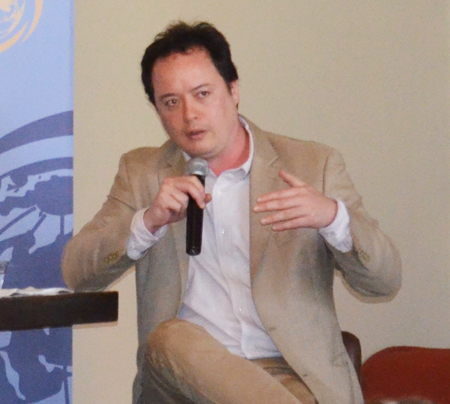
Graeme Wood
To many observers, ISIS appears to be made up of a group of psychopathic, destructive thugs with no genuine religious motivation, whose penchant for brutality almost beggars belief. But according to Graeme Wood, an Arabic-speaking writer for The Atlantic, when one talks to ISIS members the real picture that emerges is somewhat different – and in some ways even more chilling. “This is not a psychopathic movement of brutal killers with no system of thought – on the contrary.” Speaking at a LAWAC breakfast on April 20th, Wood – who is quick to point out that he has no sympathy for ISIS – says that rather than nihilists, they are, in their own frame of reference, idealists – but idealists who have undergone a bizarre “moral inversion.” Having spoken to numerous ISIS supporters across the Middle East and in Europe, Wood says they have a real sense that they are creating something positive – which is the caliphate, their self-proclaimed “Islamic State”.
Wood also says that although many of the excesses of ISIS – keeping sex slaves, beheading prisoners, cutting hands off thieves, stoning adulterers to death - are widely condemned by the majority of Muslims, for ISIS stalwarts they actually are attempting to reenact practices that were widespread in the seventh and eighth centuries when Islam was established. “They will argue that if it was good enough for Muslims then, it is good enough for them today.”
The graphic videos that ISIS routinely put up online of their most brutal acts also have a specific purpose that is far from showing gratuitous violence: “They want to attract people who are willing to do objectionable things – you have to have bought into the moral inversion.” Showing videos that they themselves know are horrific has a winnowing effect on applicants, attracting only those who are willing to jump off the edge.
While living in Cairo in 2011-12, Wood himself was targeted for recruitment by extremists, who attempted to change his lifestyle, how he dressed, the type of Arabic he spoke. To be a proper Muslim in the mindset of the traditionalists, trousers are meant to be worn above the ankle - if they go below the ankles “they drag in hell fire”. Wood’s recruiters showed him there are “Islamic” ways to pick one’s teeth, to walk in the streets, to shake hands. “Every aspect of your life has to be seen through a lens of righteousness.” They had well-honed recruitment methods, sensitive to the insecurities, fears and questions of recruits – “and they knew how to dance around the answers.” Wood went along only so far out of journalistic curiosity and then pulled out, but he realized these recruitment efforts were widespread across the Middle East – and ultimately funneled many fresh bodies to join ISIS in Syria.
ISIS also shows no hesitation in killing other Muslims – since they simply declare any Muslim who does not follow their originalist version of Islam as apostates, and hence liable for killing. They like to quote an old saying that there will be 73 sects within Islam, and only one of these will be saved – “and they think that is them.” Their longer term view is ultimately apocalyptic - “The end of time will arrive, the prophet Jesus will return, there will be massive battles, plagues, most people will die - and this is what you get if you’re good.”
In the immediate future, Wood sees ISIS suffering a precipitous collapse. Mosul in northern Iraq will soon fall to the Iraqi army, and then Raqqah, the self-designated capital of the caliphate, will fall “within 6-10 months”, Wood estimates. “This will be a pivotal point for them, because Raqqah was the place where foreign recruits would go.” Wood predicts the showdown over Raqqah will be like the Branch Davidian compound, “except on the scale of a city”. (The Branch Davidian compound in Waco, Texas was assaulted in April 1993 by the FBI and 76 people died.)
However Wood does not think the loss of the caliphate will completely end ISIS – on the contrary, they appear poised to become a “global counter-cultural movement” who already have substantial presence underground in Europe, Africa and Asia – and even some support, in far smaller numbers, here in the US. His other concern is that now ISIS is losing territory, this presents al Qaeda with an opportunity to move in and reassert itself – “maybe by blowing up a plane, or even a double-decker bus.” One battle may be coming to an end, but the war against extremism is far from over.
